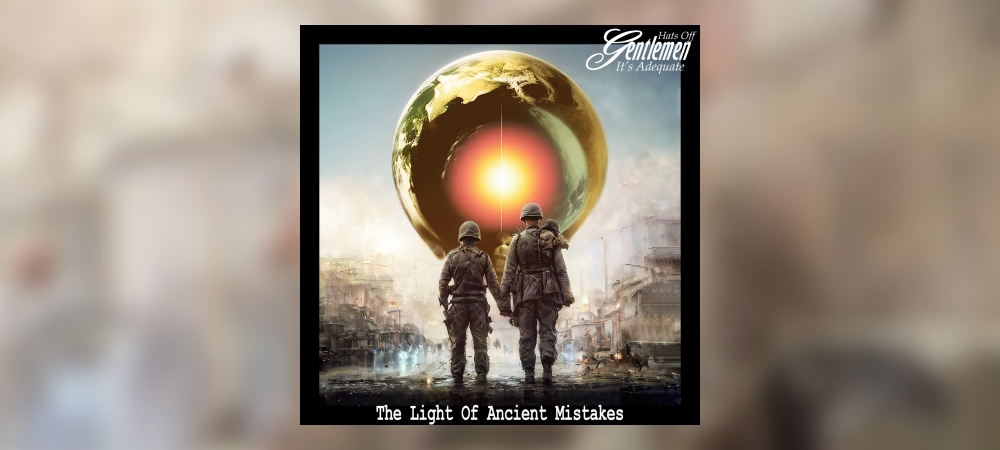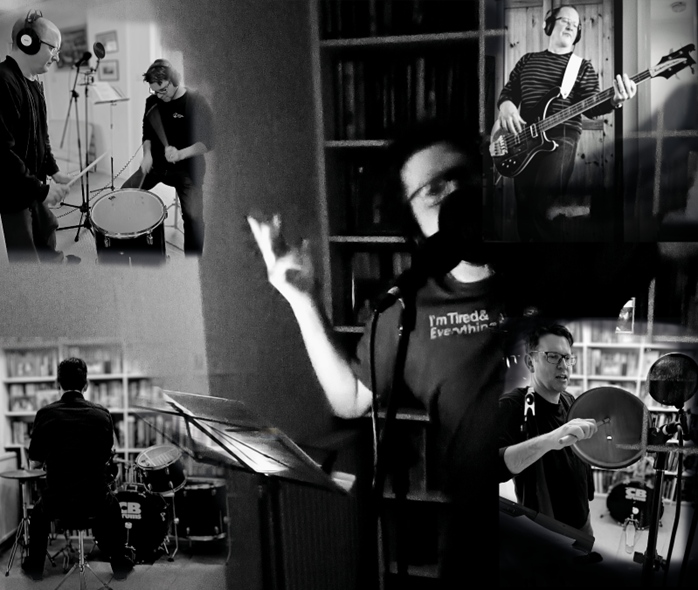The Light of Ancient Mistakes is the splendid seventh album from the eclectic UK progressive band, Hats Off Gentlemen It’s Adequate (or HOGIA for short). Following on from last year’s The Confidence Trick, it is another diverse collection of idiosyncratic and genre-defying musical styles, full of songs with thought-provoking lyrics, complemented by a variety of instrumentals, which seemingly link them together.
 HOGIA are Malcolm Galloway (vocals, guitar, keyboards and programming) and Mark Gatland (bass), along with occasional input from Kathryn Thomas (flute). Whilst they do have an identifiable signature style, the joy of their music is the broad range of their musical compositions and their intelligent lyrics that constantly challenge and surprise. They really are the musical equivalent of Forrest Gump’s ‘chocolate box’.
HOGIA are Malcolm Galloway (vocals, guitar, keyboards and programming) and Mark Gatland (bass), along with occasional input from Kathryn Thomas (flute). Whilst they do have an identifiable signature style, the joy of their music is the broad range of their musical compositions and their intelligent lyrics that constantly challenge and surprise. They really are the musical equivalent of Forrest Gump’s ‘chocolate box’.
The Light of Ancient Mistakes is not a traditional concept album, with a single narrative running through it. However, it does follow a musical and emotional journey exploring a range of themes that have felt relevant to the band over the past few turbulent years. Overall, it has a dark tone to it – exploring not only current issues, but personal thoughts and feelings and even past injustices, making it both an ambitious and challenging listen at times, but one which definitely rewards repeated listening.
Once more, Malcolm takes inspiration from a range of sci-fi novels to put the issues of today into sharp focus. There is light amongst the shade, black humour at times, and even rays of hope – but sadness, anger and despair are the overriding emotions, becoming deeply cathartic as the album progresses.
Malcolm explains, “Although my aesthetic may tend towards the bleak, I think I am neither an optimist or a pessimist overall, but somewhere in the middle. As individuals, humans are often lovely, but as a group, particularly if surrounded by an echo-chamber, we can be appalling. I don’t think we are inherently bad, but we do have evolutionary hangovers in our psychology than can be hacked by those with malicious intentions. Some people prefer their music to be apolitical, and of course I believe that people should be able to listen to what they like. But as someone writing songs, I find it very difficult not to be inspired or affected by what is going on around me. We are very concerned about what appears to be an increased normalisation of the othering of minority groups in society in recent years, in a way that appears to be designed to channel anger at the vulnerable, rather than at those taking advantage of their power.”
I’d like to thank Malcolm for sharing his thoughts and the background to the subject matter on many of the songs. Personal interpretation is always important, but hopefully this song-by-song album review opens up the underlining meaning behind many of them for listeners.
Sold the Peace opens the album in lively fashion with Mark’s funky bass creating a swaggering, disco-like dance over a busy drumbeat and subtle guitar motifs. Stabs of synthesised orchestral sounds follow as Malcolm’s despairing vocals look at the Cold War period that followed the Second World War. The lyrics explore how so much was risked winning the war only for the politicians to sell their principles so cheaply – spending billions on nuclear weapons, in the process.
To set the world free
Dead or free
The opportunity cost of the unused bombs
So much invested
Then bought the lease
We won the war
We sold the peace”
Malcolm’s anger resonates strongly, as it does on so many HOGIA tracks, with the words juxtaposed to an almost ‘Pet Shop Boys’ soundtrack. Just towards the end there is a change of tempo and some chiming piano before reprising the indictment “We spent you to your knees. We won the war and sold the peace”.
The long-term effects of conflict and failure to communicate are also key elements of the next track, The Light of Ancient Mistakes. Musically it contrasts nicely in tempo and structure with the opener. It starts with a dreamy and atmospheric Pink Floyd-like soundscape conjured up by Malcolm’s manipulated guitar and Kathryn’s stretched vibrato flute, before being joined by Rhodes-style keyboards and then a lethargic bass and drum rhythm, matching Malcolm’s tired and ominous vocals dripping resignation. Malcolm delivers a couple of short, but effective ‘Gilmouresque’ guitar solos before a contemplative, echoey conclusion.
Malcolm says the lyrics are based on Iain M Banks’s novel Look to Windward. “It explores the long-lived consequences of an atrocity. The light from a sun-destroying explosion has travelled for 800 years before reaching an orbital where a commemoration for the tragedy is due to take place. The protagonist of the song is an artificial intelligence trying to show the futility of cycles of hatred to someone planning an act of mass destruction.”
The light of ancient mistakes.
By the light of dying stars
You might see differently.”
The album artwork by Malcolm and Mark is as impressive as ever, and Malcolm’s cover art based on the title track is certainly haunting.
Transitional instrumentals are a feature of many HOGIA albums, and there are several on this album. Many are named after the work of the sci-fi writings of Adrian Tchaikovsky. Avrana Kern is Made of Ants is the first of these, and is a busy, rhythmically hypnotic track with swirling keyboards and electronica.
The Anxiety Machine is a 3-part atonal, minimalist keyboard-led instrumental, creating a suitably unsettling feeling of loneliness, desolation and separation in keeping with its title and the overall feel of the album. A bubbling mix of experimental and contemporary classical music, they successfully frame and introduce many of the songs.
Part one runs into the sombre and yearning Sixteen Hugless Years. Written after reading Adam Sisman’s biography of David Cornwall (better known as John Le Carré), it recounts his childhood experiences of emotional neglect and how it affected the rest of his life – and subsequently shaped many of scenes in his spy novels. There is a more traditional song structure here, with Mark’s rumbling bass and Malcolm’s restrained guitar chords, and snippets of keyboards accompanying the expressive lyrics (sung from Le Carré’s perspective) and memorable chorus.
Sixteen long, long years
I’ve grown old and I’m cold and hard but I’m told
I’m the life and soul but it feels so hollow
After sixteen hugless years.”
Malcom delivers another lovely, though all too short, electric guitar solo at the end to round things off.
The Requisitioner and The Wonder and Gethli and Gothi are two more instrumentals – named after spaceships and characters from Adrian Tchaikovsky’s novels. The former has a haunting quality to it and a feeling of tranquil space and depth, before the tempo rises with expressive bass and keyboards, followed by some luscious and echoing guitar and strings to complete the track. Malcolm’s use of the base of a broken floor-standing lamp as a gong works rather well too. It is probably my favourite instrumental on the album and the extended time befits its multi-layered, compositional structure.
The latter instrumental exudes funky, jazzy influences and Mark once again shows what an expressive bassist he is, as he drives the song through Malcolm’s piano improvisions and keyboard noodlings. Short and snappy, but a lot of fun.
Sandwiched between these two instrumentals is the intriguing The Glamour Boys. Another impressive song with a relaxed, mid-tempo character, with the guitar-led melody complemented by reflective and reverberating keyboard passages. Based on Chris Bryant’s book of the same name about how a group of Tory MPs, despite threats to reveal their sexuality by Chamberlain’s government, stood up against appeasement. Malcolm’s assured vocals convey the sense of injustice felt by the MPs and sadly the ongoing discrimination regarding sexual orientation that persist in many countries to this day. Many went on to risk, and in some cases lose, their lives in the Second World War.
The punishment for speaking out.
The leaks and smears and telephone taps.
The hints the threat the veiled attacks.”
imtiredandeverythinghurts is a deeply personal and emotionally charged song as Malcolm shares his thoughts on the difficulties in communicating about a chronic invisible disability, in his case with Ehlers-Danlos Syndrome (a genetic collagen disorder which causes, amongst many other problems, chronic pain). The title is based on a t-shirt design Malcolm discovered, and the lyrics question our well-intended use of ‘how are you?’ in social interactions, and the expected ‘I’m fine’ response – when it is rarely true for many people in chronic pain or with other mental or physical health issues.
Malcolm explains: “I don’t want to be dishonest with people by pretending to be fine when I’m not, but I also don’t want to drag people into a conversation about chronic pain that they may not be comfortable with. On the other hand, for those of us with conditions that vary from day to day (or hour to hour), it may be important to communicate what our current level of functionality is. I am also aware that there is no negative intention behind the question, and the last thing I want to do is to discourage people from communicating. The song doesn’t offer any answers, but I hope illustrates an aspect of living with an invisible disability.”
Musically, it is as energetic and aggressive rocker and as direct as any 3-minute punk rock pop song from the late-’70s, with driving guitar riffing and an urgent beat. The insightful lyrics flow at speed and Malcolm even throws in a quick solo before the sudden end. It is another example of the broad church of musical styles within HOGIA.
So you might not notice
That I’m falling apart.
I’m close to an edge,
I need help.
If this time you’re really asking,
I’m tired and everything hurts.”
Walking to Aldebaran is quite a departure even by the standards of HOGIA. A sad, quirky, multi-faceted and schizophrenic song, but not without some wry dark humour, that contains an amalgam of different musical styles. I’ll admit to it taking a few plays for it to click with me, but once you know the meaning behind the lyrics, it makes sense. I’ll let Malcolm explain:
“Awkward communications, although in this case between different parts of the shattering self of the protagonist, continue with this song. Inspired by Adrian Tchaikovsky’s novella of the same name, and includes quotes used with the kind permission of the author. In the story, the space-ship pilot, Garry Rendell (a reference to Grendel perhaps?), is exploring an ancient maze-like space object. Due to a miscommunication between himself and an old, possibly malfunctioning but well-intentioned machine, he is transformed into a monster. This song aims to jump between different styles, from prog metal to musical theatre and contemporary classical music, to reflect the different shards of the shattered mind of poor Gary – and is sung from his perspective.”
Malcolm says that the rhythm and time signature were written to fit the speech patterns in the novel and was a different approach to his usual method of writing. Malcolm’s stream of consciousness style of singing is especially suited to this approach. He also cites Peter Maxwell Davies’s 8 Songs for a Mad King, but I also felt there were even subtle elements of Zappa and Captain Beefheart under the surface.
The song starts boldly with a Dream Theater-like prog metal character, with bursts of guitar, pounding drums and racing piano, soon joined by expressive flute soloing from Kathryn. Malcolm’s vocals rage at the changes taking place within him:
I’ve been changed by the mother machine.
I am the thing that used to be me.”
There are fresh elements of free-form jazz in the piano and rhythmic time signature changes and more guitar riffs before a haunting, dreamy synthesiser passage. However, a shift to almost Bertolt Brecht-like theatrics adds some wonderful black humour to proceedings:
They didn’t mention getting lost, and eating corpses,
When I was at astronaut school.”
A more manic, absurdist atmosphere takes over as our protagonist increasingly talks to himself to retain any sense of identity and the music darkens and becomes more fragmented.
I used to talk to myself to keep me sane,
But I think we’ve moved a bit beyond that, don’t you?
After the final flurry, the music ends on a calmer, more serene and yet sadder theme, with a plaintive guitar solo, as poor Garry seems resigned to his fate or ponders his future:
Keep looking for someone,
Someone, that looks just a bit like me.”
The track is definitely progressive in nature and will reward those listeners who delve deeper into its lyrics and musical twists and turns. It is interesting to think that, in reality, the monsters of the world are less obvious to us, without their claws and fangs. As Malcolm says, “They are the people some of us become, and some of us tacitly allow to take power, when we fail to control the worst aspects of human nature.” Very topical indeed!
Goodbye Cassini is a beautiful, though poignant, instrumental tribute to the NASA probe to Saturn and its moons, which was deliberately crashed into its atmosphere after almost 8 billion kilometres of scientific exploration. It’s a perfect come down from the intensity of the last track. There is some lovely flute playing from Kathryn throughout, with the notes soaring high and proud, over the relaxed tempo and shifting minimalist musical structures created by Malcolm and Mark beneath it.
The Man Who Japed, is based on a Philip K Dick novel (HOGIA fans will already know Malcolm’s great love of science fiction and the inspiration it gives him). In the book, a previously obedient government official, is surprised to find that he has severed the head of a statue of their dictator in a symbolic act of resistance putting himself at great risk (perhaps a thematic link to The Glamour Boys track from earlier?). The breezy, melodic and flowing instrumental has all the typical elements we have come to expect from the band – with bright keyboards, guitar, bass and drums combining refreshingly, with some nice proggy complexity – yet remaining rather accessible and catchy as well.
The final song, the lead-off single, is the environmentally themed Burn the World. It’s a deeply emotional and unsettling plea for us to do something about our environment, from the perspective of someone from the future looking back with regret on the things we didn’t do now. It has a plaintive and sad tone with Malcolm’s tired and melancholic vocals really seeping into you with repeat plays, and the mournful closing guitar solo resonates in a cathartic way. The lyrics say it all, and sadly have even more relevance, given the apparent effects of climate change seen around the world this Summer:
Just enough to give ourselves a chance,
But it’s easier to fail.
We never learned to change.
All the things we could have done, and we chose to burn the world.”
Interesting, the guitar solo is played on a Squire Stratocaster and was originally intended to be the ‘placeholder’ solo. I’m pleased Malcolm and Mark liked it enough to keep it in. Not bad for an £80 buy from eBay!
Hats Off Gentlemen It’s Adequate have produced yet another fine, intelligent, contemporary and eclectic album, displaying their full range of musical styles, including progressive rock, art rock, avant garde, electronica, pop, minimalist classical, jazz and even funk. It is another ambitious and challenging artistic statement, with six diverse instrumentals (one in three parts) and songs with thought-provoking lyrics. A dark album for sure, which oscillates between anger and resignation – both political and deeply personal – yet not without light amongst its shade, with a twinkling candle of hope still flickering.
An album that needs an investment in time to fully take in and understand its deeper meaning. An album to revel in its stylistic variety and haunting atmospherics and the common thread that runs through many of its tracks. For those already familiar with the band, it is a ‘must buy’. However, if you are yet to discover their ‘left field’ charm, and you welcome musicians willing to take the road less travelled at times, then The Light of Ancient Mistakes is worth exploring further.
TRACK LISTING
01. Sold The Peace (4:16)
02. The Light Of Ancient Mistakes (6:41)
03. Avrana Kern Is Made Of Ants (3:30)
04. The Anxiety Machine Part 1 (2:10)
05. Sixteen Hugless Years (3:52)
06. The Requisitioner And The Wonder (6:36)
07. The Glamour Boys (4:38)
08. Gothi And Gethli (3:38)
09. imtiredandeverythinghurts (2:43)
10. The Anxiety Machine Part 2 (2:48)
11. Walking To Aldebaran (8:56)
12. Goodbye Cassini (4:40)
13. The Anxiety Machine Part 3 (1:41)
14. The Man Who Japed (5:10)
15. Burn The World (5:50)
Time – 67:09
Digital Bonus Tracks
16. The Man Who Japed (Radio Edit) (5:31)
17. The Anxiety Machine Part 1 (Radio Edit) (2:35*
18. The Anxiety Machine Part 3 (Radio Edit) (1:37)
19. Sixteen Hugless Years (Radio Edit) (3:53)
Time – 13:36
Total Time – 80:45
MUSICIANS
Malcolm Galloway – Lead/ & Backing Vocals, Guitars, Keyboards, Synths, Additional Drums/Percussion, Programming
Mark Gatland – Bass Guitar, Chapman Stick, Keyboards, Additional Guitars, Additional Drums/Percussion, Backing Vocals
Kathryn Thomas – Flute (tracks 2,11 & 12)
MUSICIANS
Record Label: Glass Castle Recordings (CD, Digital)
Country of Origin: U.K.
Date of Release: 9th September 2023
LINKS
Hats Off Gentlemen It’s Adequate – Website | Facebook | Bandcamp | YouTube


